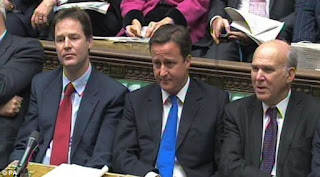History divides time up into eras and periods, creating time frames where changes of significance happened - think of the Renaissance Era, or the Interwar Years, which cover the Renaissance and the gap between World Wars respectively.
Now consider that every few years there is a ‘momentous event’. This is an event of a certain magnitude and scope that it must be classed as ‘momentous’; either because it’s large in scale and brings about instant change, or because several years later, academics will say ‘that was a key turning point in the development of weaponry/society/economics’.
This may be the creation of democracy in the US in 1783, or the Franco-Prussian War unifying Germany. It may cause instant repercussions, or it could create subtler, more implicit changes over time.
But a Momentous Event will often either begin the end of an era, or usher in a new one. Sometimes both.
Our most recent ME was the Banking Crisis in 2007-08. Before that, it was the collapse of the USSR in 1991. The 9/11 attacks make a claim to be in that category too.
So, let us assume that if the USSR’s dissolution was the end of an era (which it was; the Cold War), then what era came next? And has it stopped, or is it still going?
Because this blog is arguing that it’s stopped. That the 27 years since that colossal rotation of the sun have now ended, and are enclosed in their own time frame, their own ‘era’ for historians to argue over.
The Globalised Era
With the breaking down of Communist walls and the rapid expansion of the EU (joined by the WTO), world trade entered a boom as countries knitted together economically. The terrorist attacks in 2001 may have slowed the boom, but they didn’t really halt it; people continued to enter employment and take out loans, and countries got closer, lowering tariffs and encouraging free trade [this is globalisation in a nutshell].
What did stop the boom then? That would be the imminent destruction of the banking system plunging the world into a panicked recession. And this ME does indeed end an era - but not right that moment. It actually totters along for eight more years.
Because it’s in 2016 when citizens all around the world notice that wages are still flat, living standards stagnant, and the poor in the same position as they were eight years ago, when they were promised rejuvination and overhaul, as Lehman Bros. and Bear Sterns dissolved around them.
They’d tried Obama’s ‘Hope’ and Cameron’s ‘Compassionate Conservatism’. They’d seen repeated Italian governments fall into the dust, and Greece on the tipping point of anarchy. Their steel plants had been bought out, their welfare slashed, their education mauled, and the rich got richer, as the poor got poorer.
So they spoke out. And they voted for real change. ‘Leave’ and Trump in 2016; the destruction of France’s two main parties in 2017; the Northern League in Italy, and Catalonian independence in 2018. They found their voice, and yelled it with fury. But it seems that they may have yelled in the the wrong direction.
Because Trump, for four years or eight, will wreck the world economy. Leaving the EU will damage the UK’s own, and take a chunk of the Union’s too. The populist coalition in Italy has no meaningful plan to revive their country, but points at immigrants as scapegoats. Instead, all three will look inwards, reject the world, and strive for self-sufficiency. In their wake, the world will follow.
Free trade may collapse, and the EU become a shadow of itself. All the jobs and income dependent on inter-linked goods and services will be reduced. Countries will revert to pre-WWII trade barriers, protecting their own.
And the interconnected, globalised, sociable world that was created after the USSR’s death will quietly fade from existence.
And so, historians will argue over the exact year and time period. But they will agree on one thing. That it was in the late 2010s when the Globalised Era came to a sad, shuddering stop.







































